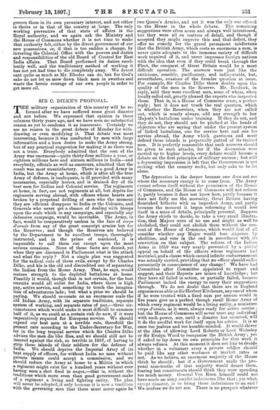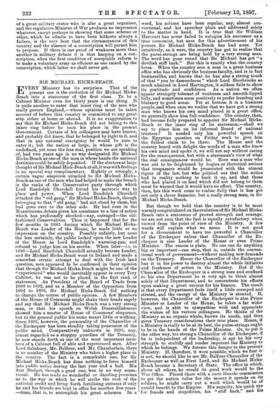SIR C. DILITR'S PROPOSAL. T HE military organisation of this country
will be re- formed after we have suffered some great disaster and not before. We expressed that opinion in these columns thirty years ago, and we have seen no substantial reason as yet to condemn it as inaccurate. Certainly we see no reason in the great debate of Monday for with- drawing or even modifying it. That debate was most interesting, because it was conducted by men with large information and a keen desire to make the Army strong, but of any practical suggestion for making it so there was not a trace. Everybody admitted that the cost of the Army was enormous—quite thirty-four millions a year, or eighteen millions here and sixteen millions in India—and everybody, officials as well as amateurs, admitted that the result was most unsatisfactory. There is a good Army in India, but the Army at home, which is after all the true Army of defence, is inadequate, is ill provided with many necessaries, especially horses, and is drained dry of its best men for Indian and Colonial service. The regiments at home, in fact, are not regiments at all, but depots for regiments serving abroad, with officers whose hearts are broken by a perpetual drilling of men who the moment they are efficient disappear to India or the Colonies, and Generals who never get a chance of dealing with troops upon the scale which in any campaign, and especially any defensive campaign, would be inevitable. The Army, in fact, would be comparatively useless in the face of corps d'artnee from any of the great conscript armies but for the Reserves ; and though the Reserves are believed by the Department to be excellent troops, thoroughly instructed, and in the prime of manhood, it is impossible to call them out except upon the most serious occasions. None of these facts are denied, yet when they are discussed in Parliament what is the attack and what the reply ? Not a single plan was suggested for the radical cure of these evils, except by Sir Charles Dilke, and his is the old and discredited one of separating the Indian from the Home Army. That, he says, would restore strength to the depleted battalions at home. Possibly it would, though that is not certain, for the best recruits would all enlist for India, where there is high pay, active service, and something to touch the imagina- tion of adventurous lads ; but what a price we should, be paying. We should re-create on an enormous scale the old Indian Army, with its separate traditions, separate system of working, and separate rates of pay,—three cir- cumstances which would make it most difficult to summon half of it, as we could at a certain risk do now, if it were imperatively required for European service. We should expend our best men at a terrible rate, threefold the present rate according to the Under-Secretary for War, for in the long tropical service which Sir Charles Dilke advises the men die like flies, and we should still not be insured against the risk, so terrible in 1857, of having to strip these islands of their soldiers for the defence of India. We should. deprive the Imperial Army of its best supply of officers, for without India no man without private means could accept a commission, and we should reduce the Army at home to a Militia in which a regiment might exist for a hundred years without ever having seen a shot fired in anger,—that is, without the traditions which more even than good government make of a regiment a living and fighting entity. The plan will never be adopted, if only because it is now a tradition with the governing men that there must never again be two Queen's Armies, and yet it was the only one offered. to the House in the whole debate. The remaining suggestions were often acute and always well intentioned, but they were all on matters of detail, and though if accepted they might improve this and that defect, they offer no remedy for the grand permanent misfortune that the British Army, which costs so enormous a sum, is never quite adequate to the immense variety of difficult work required of it, and never impresses foreign nations with the idea that even if they could break through the Fleet, the conquest of Great Britain would be a most difficult operation. The answers were just like the criticisms, sensible, pacificatory, and indisputable, but, nevertheless, evasions of the broader question at issue. For example, Sir Charles Dilke threw doubts upon the quality of the men in the Reserve. Mr. Brodrick, in reply, Said they were excellent men, some of whom, when locally called out, greatly pleased the experts who inspected them. That is, in a House of Commons sense, a perfect reply; but it does not touch the real question, which is whether the Reservists, when they are not called out, which is nearly always, add any strength to her Majesty's battalions under training. If they do not, and they do not, they should not be pitched at the heads of objectors who are saying that under the present system of linked battalions, one for service here and one for service abroad, the Army which garrisons and must defend these islands is perpetually gutted of its trained men. It is perfectly reasonable that such answers should be given to such attacks, for if the discussion were carried up to higher levels, every debate would become a debate on the first principles of military success ; but still a depressing impression is left that the Government is not seeking what the country seeks, but only asks to be let alone.
The depression is the deeper because one does not see where the necessary energy is to come from. The Army cannot reform itself without the permission of the House of Commons, and. the House of Commons will not reform it, partly because it does not know how, partly because it does not fully see the necessity, Great Britain having flourished hitherto with an imperfect Army, and partly because the moment it began reforming it would lose itself in a mass of details, principally personal. Suppose the Army chiefs to decide, to take a very small illustra- tion, that Majors were of no use and might as well be abolished, they could not abolish them without the con- sent of the House of Commons, which would firat of all consider whether any Major would lose sixpence, by abolition, and vote in the end in accordance with ,its conviction on that subject. The reform of the Indian Army in 1859 was very nearly prevented by a pitiful appeal on behalf of the officers whose regiments had mutinied, and a clause which caused infinite embarrassment was actually carried, providing that no officer should suffer pecuniarily in consequence of any change! We have had Committee after Committee appointed to report and suggest, and their Reports are mines of knowledge ; but they have all failed in action, or partially failed, because Parliament lacked the energy to carry their suggestions through. We do not doubt that there are in England organisers as able as SirHerbertKitchener, any one of whom if he were trusted with a fixed sum per annum would in five years give us a perfect though small Home Army of which every regiment would be a living entity, a, miniature corps d'armge, as it were, always ready for active service ; but the House of Commons will never trust any individual with such power, nor, until a disaster has occurred, wit it do the needful work for itself upon his advice. It is at once too jealous and too humble-minded. It would shiver at the idea of allowing Lord. Roberts or Lord Wolseley or Sir Evelyn Wood to reorganise the British Army ; yet if asked to lay down its own principles for that work it always refuses. At this moment it does not like to...decide., whether in a voluntary army a private soldier should• be paid like any other workman at market, rates or not. As we believe, an enormous majority of the House think he should ; but if a Government made the pro- posal nine-tenths of that majority would desert them, fearing lest constituents should think they were spending too much money. General Von Roon himself could not have made an army amidst indecisions like that ; yet what, except disaster, is to bring those indecisions to an end ? We confess we do not see. There is no prospect whatever of a great military orator who is also a great organiser, and the regulation Minister of War produces no impression whatever, except perhaps in showing that some scheme or other, which he admits to have been hitherto always a failure, is the very best that the circumstances of this country and the absence of a conscription will permit him to propose. If there is one proof of weakness more than another in military debate it is that harping on a con- scription, when the first condition of acceptable reform is to make a voluntary army as efficient as one raised by the conscription, which latter we shall never get.



































 Previous page
Previous page